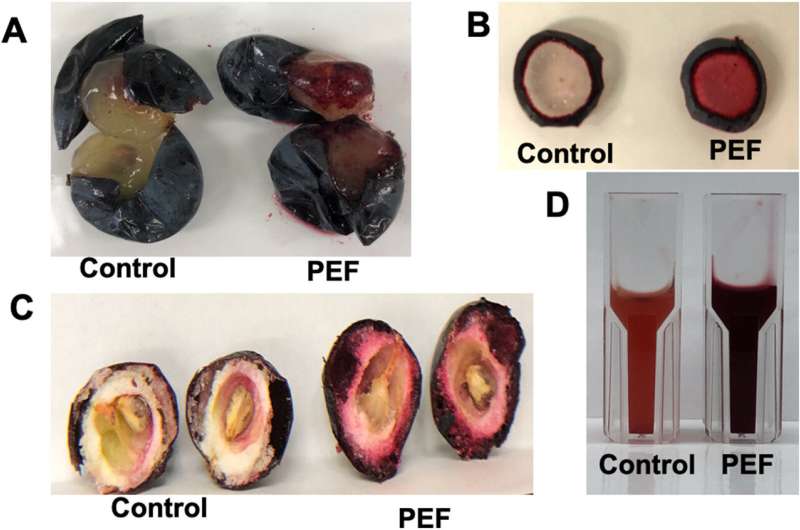This article has been reviewed according to Science X's editorial process and policies. Editors have highlighted the following attributes while ensuring the content's credibility:
fact-checked
trusted source
proofread
New method produces fresher, tastier cold-pressed Concord grape juice

A new process developed at Cornell AgriTech can produce antioxidant-rich cold-pressed Concord grape juice with a longer shelf life, meeting rising demand for minimally processed juices that are tastier and more nutritious.
Until now, Concord grape juice mainly has been produced using hot pressing and thermal pasteurization, which may result in flavor changes as compared to fresh juice. Cold pressing presents the challenge of extracting the juice and its key components without heating the fruit or adding enzymes to break the tissue. Cornell AgriTech's first-of-its-kind research combines the nonthermal processing technologies of pulsed electric field (PEF) and high-pressure processing (HPP).
"It's a wonderful product," said Olga I. Padilla-Zakour, professor of food science at Cornell AgriTech and co-author of "Evaluation of Pulsed Electric Field and High Pressure Processing on the Overall Quality of Refrigerated Concord Grape Juice," which was was published in the April 2024 issue of LWT.
"It's very exciting that now there will be new opportunities for companies to start applying this process to create innovative products."
The research could be applied to the processing of other juices, especially of fruits where the color and nutrients are concentrated in the skin, such as cherries and blueberries, Padilla-Zakour said.
For the study, co-authored with Yuanyuan Li, Ph.D. '22, grapes were harvested in the Finger Lakes region and crushed. The mash was treated with electric field pulses that create micro perforations in the grape tissue, allowing the efficient extraction of the color and bioactive compounds from the skin without the application of heat. It was then pressed to obtain the juice.
"It basically takes seconds with minimal changes in temperature," Padilla-Zakour said.
The juice samples were refrigerated for 24 hours for stabilization then put into flexible plastic bottles and processed with high pressure. The results showed that PEF significantly increased yield, color intensity and phenolic content, and HPP extended the refrigerated shelf life of cold-pressed juice to at least five months, whereas most fresh-squeezed juice stored in the refrigerator should be consumed within one to three days.
In addition, Padilla-Zakour said the juice processed using PEF and HPP had better antioxidant and anthocyanin values compared to thermally pasteurized cold-pressed juice. Anthocyanins are the pigments found in red and purple foods that provide a number of health benefits.
To assess the taste, a sensory evaluation trial was conducted with 101 untrained panelists who sampled and compared the cold-pressed juices processed in three ways: thermally pasteurized, HPP treated, and PEF plus HPP processes combined. The panelists gave highest marks in appearance, authenticity, aroma and flavor to the Concord grape juice processed with PEF and HPP, suggesting that this technology offers opportunities to expand the market.
"This research provides guidelines for the industry to produce this novel juice commercially," Padilla-Zakour said. "It can lead to premium Concord grape products in the market and is a new avenue for cold-pressed Concord grape juice."
Harvested for juice, jelly and wine, Concord grapes are an important crop in New York state, with growers in the Lake Erie concord grape region producing 121,000 tons each year on 30,000 acres of vineyards. Grape-related production contributes an estimated $340 million annually in economic impact in the state, according to Farm to Institution, New York state. Concord grapes have many reported health benefits, including reducing the risk of cardiovascular disease, reducing inflammation and moderating glycemia.
"Concord grapes are the most widely planted in New York state and have been an important commodity for over 100 years," said Sam Filler, president of the New York Wine and Grape Foundation.
"Cornell University has been an important partner to the industry in researching ways to enhance the uses of concord grapes to ensure it remains a viable commodity grown in New York."
More information: Yuanyuan Li et al, Evaluation of pulsed electric field and high-pressure processing on the overall quality of refrigerated Concord grape juice, LWT (2024). DOI: 10.1016/j.lwt.2024.116002
Provided by Cornell University




















